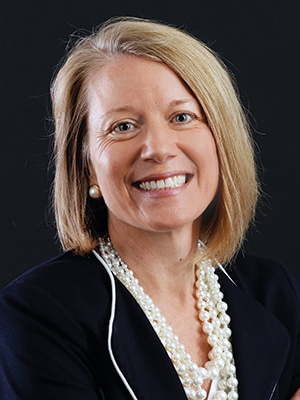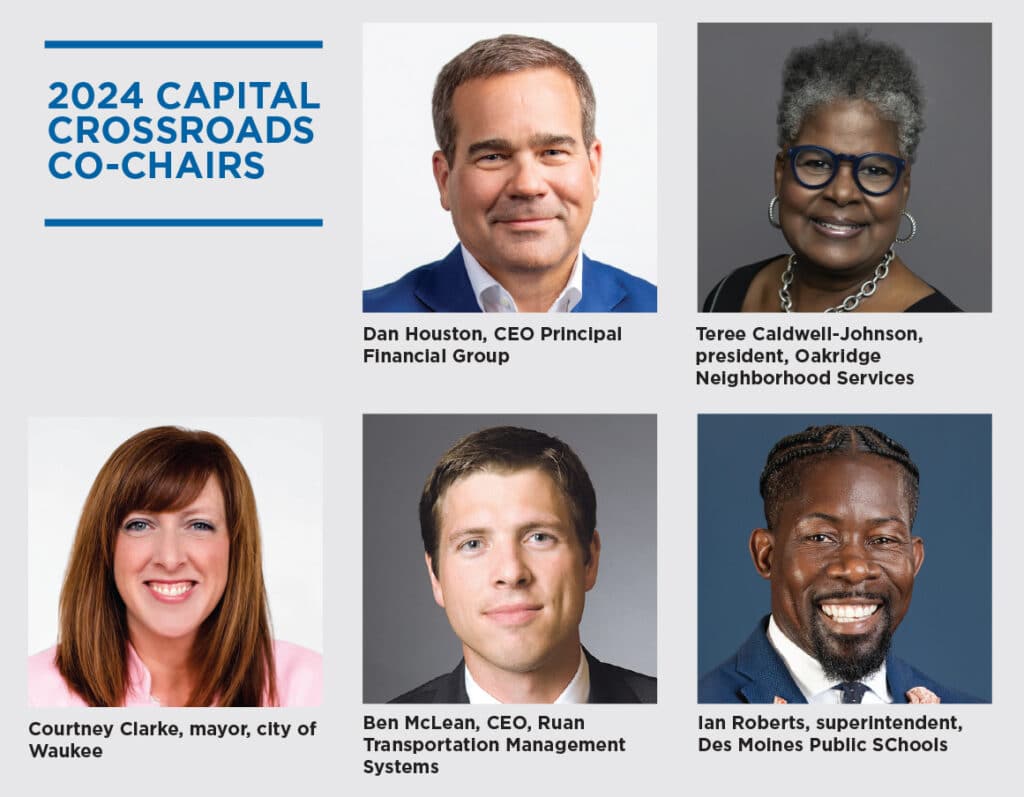Capital Crossroads leaders say new roadmap addresses ‘basic fundamental issues’
The plan extends to 2040 with first 2 years focused on education, workforce housing

Mike Mendenhall Feb 9, 2024 | 6:00 am
5 min read time
1,142 wordsEconomic Development, Government Policy and Law, TransportationOne of the first things leaders of the Central Iowa visioning initiative Capital Crossroads did when developing a 2040 roadmap for the region was call the Polk County Housing Trust Fund to plan a listening tour.

In an interview Jan. 26, Capital Crossroads’ newly hired Executive Director Kaity Patchett said the business, local government and nonprofit leaders guiding the 13-year-old effort will focus their efforts over the next two years on two of the four outcome areas in the “Central Iowa’s Roadmap to Opportunity and Prosperity for All” report – workforce housing and education.
“Those issues don’t exist in a vacuum,” Patchett said. “Education and workforce housing are tied together, and they’re also tied to job growth, which is another one of our critical outcomes. They’re tied to community and cultural connections in terms of creating a vibrant and desirable region. These issues affect one another.”
The roadmap final report, released Jan. 10, also lists job growth and placemaking as its other two critical areas for the region. It also has two more broadly desired progress outcomes in stressing regionalism in planning and equity and inclusion.
The roadmap is Capital Crossroads’ third iteration since the initiative was launched in 2011. According to the organization, it connects hundreds of volunteers and brings together regional organizations, city governments, school districts, nonprofits and residents to work on projects and broader issues collectively.
Past Capital Crossroads pushes led to Iowa Confluence Water Trails, the Des Moines Regional Workforce Housing Strategy – which later inspired Here We Grow equitable workforce housing project – the DSM 4 Equity Collective, the Central Iowa Code Consortium and One Million Trees for Central Iowa, according to the report.

Jackie Norris is a Capital Crossroads adviser and president of consulting firm Horizon Group, formerly SPPG, which worked on the long-term plan.
She said nearly a year of focus groups and listening sessions with CEOs, government officials and people on the ground in Central Iowa communities showed that after Capital Crossroads 2.0 in 2017, “we all realized that the next iteration probably required a little bit of a shake-up.”
“What you heard from the group on the ground was if you keep ignoring basic fundamental issues like workforce housing, child care, and all of the things that I think are highlighted a little bit more in this plan, then there will be nobody here,” Norris said.
The roadmap report says investments in education, housing and youth would “reduce disparities within our communities and establish sustainable channels to prosperity and well-being. Simultaneously, there is strong support for ongoing placemaking efforts aimed at developing attractions and amenities,” a fundamental goal for Capital Crossroads.
Norris said Capital Crossroads also hired a futurist to look at data and trends to determine the focus areas. According to Norris, one of the first comments she heard after the announcement was a concern that health care wasn’t addressed as a focus outcome.
But Capital Crossroads leaders say many of the issues intersect to benefit many other issues Central Iowa is facing.
“Not everybody’s issues are reflected,” Norris said. “And that can be difficult, but I think people feel good about what was selected.”
The report says Capital Crossroads had a 36-member steering committee and a 50-member advisory council of area business, nonprofit and government leaders.

In 2024, Capital Crossroads will be led by five co-chairs:
- Principal Financial Group CEO Dan Houston
- Teree Caldwell-Johnson, president of Oakridge Neighborhood Services
- Courtney Clarke, mayor of the city of Waukee
- Ben McLean, CEO of Ruan Transportation Management Systems
- Ian Roberts, superintendent of Des Moines Public Schools
Workforce housing
Central Iowa workforce housing and education leaders see these issues as tied to quality of life and workforce development and retention for the region.

Those involved in Capital Crossroads planning, like Polk County Trust Fund Executive Director and Regional Council member Toby O’Berry, said the organization can get “everybody in the room” so Des Moines-area cities and nonprofits can develop workforce housing solutions together.
“What doesn’t go well is if the Polk County Housing Trust Fund went to each of these cities and said, ‘Here’s what you need to do.’ No one wants to be told anything,” O’Berry said.
O’Berry said the region needs about 11,000 affordable housing units to house people making 30% or less of the area median income.
O’Berry said one outcome from Capital Crossroads could be a housing study inventorying the region’s available workforce and affordable units.
He said regional leaders could work through Capital Crossroads to develop policy and programs reducing hidden costs and regulatory barriers to affordable housing like high-level parking requirements; allowing higher density residential projects in commercial corridors on public transportation routes; and adjusting land use and zoning codes.
Developer incentives are also an area where O’Berry thinks cities could collaborate through Capital Crossroads.
“I think Des Moines is the high watermark for [workforce housing] incentives, at least in our region. But there’s always room for growth,” O’Berry said. “And that’s part of what we want to do with Capital Crossroads is bring city staff into a room from all of Polk County cities and have a conversation around economic development incentives together and have it be a safe space to just talk about it. We haven’t had that yet.”
City perspective
The Waukee mayor said there is a perception that Des Moines suburbs don’t have the same challenges as Des Moines.
“That’s not the case,” Clarke said. “While they might be slightly different in terms of severity or levels or which [issues] impact us the most, those regional trends that were identified in the Capital Crossroads visioning process really impact us too.”
She hopes the roadmap can help solve brain drain or out-migration of workforce talent, workforce housing and develop ideas to support education “in a different way.”
Education in workforce
Roberts said when he thinks about youth investment planning through Capital Crossroads, he envisions growing and doing a “deeper dive” in early childhood education and preschool programing and how that can increase and strengthen the region’s workforce.
That access to child care would increase the number of parents who could enter or reenter the workforce, he said
“What I’m looking forward to seeing in the first two years [of the roadmap] is how are we really and truly strengthening our community connections and really bolstering opportunities for Des Moines Public Schools graduates to have access to solid post-education options, and equally as important to have access to the workforce,” Roberts said.
According to Norris and Patchett, Capital Crossroads is hoping to show tangible projects and make more announcements in the coming months.
“This is the community’s plan,” Patchett said. “Capital Crossroads was very intentional about engaging community members in a robust and inclusive way to gather their feedback on which current and future trends were going to have the greatest impact on our region.”

Mike Mendenhall
Mike Mendenhall is associate editor at Business Record. He covers economic development, government policy and law.










